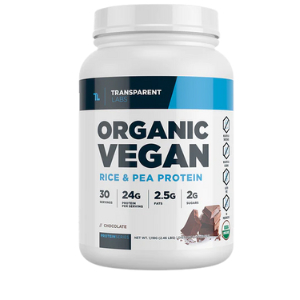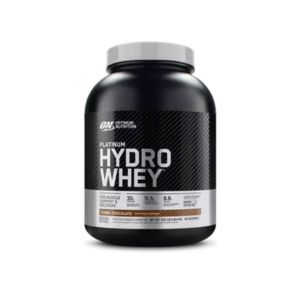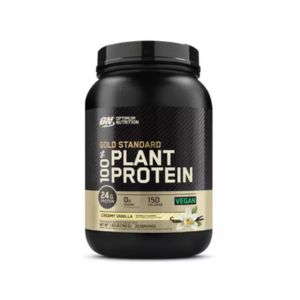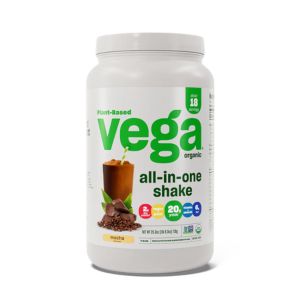 Expert's opinion
Expert's opinion
The article is a subjective view on this topic written by writers specializing in medical writing.
It may reflect on a personal journey surrounding struggles with an illness or medical condition, involve product comparisons, diet considerations, or other health-related opinions.
Although the view is entirely that of the writer, it is based on academic experiences and scientific research they have conducted; it is fact-checked by a team of degreed medical experts, and validated by sources attached to the article.
The numbers in parenthesis (1,2,3) will take you to clickable links to related scientific papers.
Best Lactose-Free Protein Powders 2024: Top Brand Reviews
All articles are produced independently. When you click our links for purchasing products, we earn an affiliate commission. Learn more about how we earn revenue by reading our advertise disclaimer.

Transparent Labs Organic Vegan Rice & Pea Plant Protein Powder
- 24 grams of plant-based protein per serving
- Vegan-friendly
- Made with organic rice and pea plant protein
- 60-day money-back guarantee
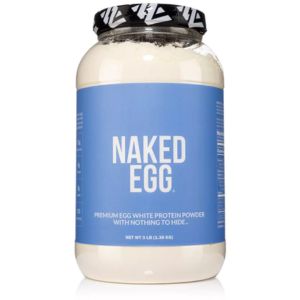
Naked Nutrition NAKED EGG Egg White Protein Powder 3LB
- 25 grams of protein per serving
- Dairy-free
- Can be used in protein shakes or baked goods
15% Off Coupon: HEALTHCANAL
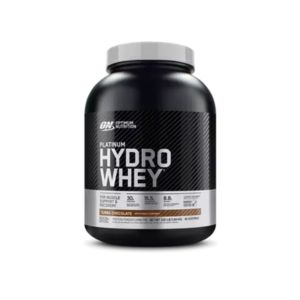
Optimum Nutrition Platinum Hydrowhey
- 30 grams of protein per serving
- Quick-digesting
- Contains naturally occurring and added branched-chain amino acids (BCAA)
- Multiple purchasing options
Lactose is a disaccharide made of two individual units; glucose and galactose. It is the primary carbohydrate in milk and can be found in almost all dry dairy products. You may even hear it called “milk sugar” on occasion.
People with lactose intolerance may experience uncomfortable gastrointestinal symptoms after eating foods containing lactose. Lactose content can vary among different foods as the manufacturing process and time in processing and storage can cause a breakdown of the disaccharide.
Reactions involving lactose can even affect ingredient processing[1] for certain foods. For example, ice cream has a higher lactose content than certain cheeses.
When it comes to protein supplements, many protein powders contain lactose. However, lactose-intolerant people don’t have to miss out on the many benefits that protein powders can provide.
This article will review five products in today’s market to help you in your search for the best lactose-free protein powders for your needs.
Best Non-Diary Protein Shakes In (April. 2024)
- Transparent Labs Organic Vegan Rice & Pea Plant Protein Powder – Editor’s Choice
- Naked Nutrition NAKED EGG Egg White Protein Powder 3LB – Lowest Carbohydrate Content
- Optimum Nutrition Platinum Hydrowhey – Most Protein Per Serving
- Optimum Nutrition Gold Standard 100% Organic Plant Based Protein Powder – Largest Serving of Vitamin C
- Vega One Organic All-in-One Shake – Most Dietary Fiber Per Serving
Best Lactose-Free Protein Powder In 2024
Transparent Labs Organic Vegan Rice & Pea Plant Protein Powder
In every serving of the Transparent Labs Organic Vegan Rice and Pea Plant Protein Powder, you get 24 grams of protein without the lactose. In addition, these plant-based proteins provide a complete amino acid profile without any gastrointestinal distress related to lactose intolerance.
- 24 grams of plant-based protein per serving
- Vegan-friendly
- Made with organic rice and pea plant protein
- 60-day money-back guarantee
- Only two flavors are available
Transparent Labs has another winner on its hands with its Organic Vegan Rice and Pea Plant Protein Powder. It is a lactose-free protein powder that provides 24 grams of protein per serving, all sourced from plant-based proteins.
In addition, the supplement provides consumers with a complete amino acid profile between the rice and pea protein ingredients, meaning it contains all nine essential amino acids that our bodies cannot produce.
It contains no artificial sweeteners, preservatives, or coloring and is gluten-free. Consumers can choose between two flavors (French vanilla or chocolate) and have the option to subscribe and save. In addition, you can purchase the protein powder confidently because if you are not satisfied, Transparent Labs offers a 60-day money-back guarantee.
Naked Nutrition NAKED EGG Egg White Protein Powder 3 LB Non-GMO
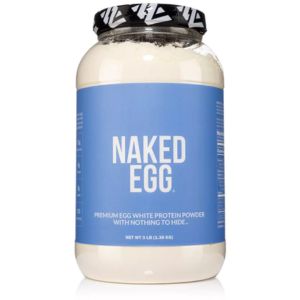
15% Off Coupon: HEALTHCANAL
Naked Egg protein powder provides 25 grams of protein per serving, all from egg white protein. This low-carbohydrate (low-carb) protein powder can be used in a protein shake or added to your favorite baked goods.
- 25 grams (g) of protein per serving
- Can be used in protein shakes or baked goods
- Includes 5.8 grams BCAAs
- Sourced from ingredients free of genetically modified organisms (non-GMO)
- Each serving requires two scoops
Naked Nutrition’s Naked Egg Protein Powder contains egg white protein powder sourced from non-GMO chicken eggs. The fresh eggs are processed into protein powder within one day to preserve their complete amino acid profile.
There are no additives or artificial sweeteners included in the final product. It is one of the best dairy-free protein powder options, making it safe for lactose-intolerant consumers, and it is certified gluten-free.
Egg white protein is known as a complete protein containing all the essential amino acids required to build and maintain muscle mass.
Each serving of Naked Egg provides 25 grams of protein and 5.8 grams of BCAAs.[2] Furthermore, each serving is only 110 calories, so it contains minimal to no carbohydrates and fat. This low-carb protein powder contains only two grams of carbohydrates per serving.
Naked Egg protein powder is unflavored so that it can be used in a shake on its own mixed with water or as part of a shake recipe with other ingredients. You can even add it to your favorite baking recipes to give your favorite baked goods a boost in protein.
Optimum Nutrition Platinum Hydrowhey
Optimum Nutrition Platinum Hydrowhey protein powder provides 30 grams of protein per serving. Just like much of the carbohydrates and fat, the lactose in the product has been removed, making it safe for lactose-intolerant consumers.
- 30 grams of protein per serving
- Quick-digesting
- Contains naturally occurring and added branched-chain amino acids
- Multiple purchasing options
- Limited stock availability
- High cost per serving
- Contains sucralose, acesulfame potassium (Ace-K),[3] and maltodextrin
Optimum Nutrition’s Platinum Hydrowhey protein powder provides 100% hydrolyzed whey protein isolate, making it easy to digest.
The formula includes artificial sweeteners that may adversely alter the gut microbiome, raise blood sugar, and cause some consumers gastrointestinal distress. Maltodextrin is a highly processed food starch with a glycemic index equal to sugar. All of these ingredients may prove problematic to some individuals.
Filtering systems during manufacturing isolate most of the product’s fat, carbohydrates, and lactose. The protein that remains undergoes hydrolyzation, breaking it down into smaller pieces. As a result, the whey isolate can get into your system quickly and support your muscle recovery.
Furthermore, each serving of Optimum Nutrition’s Platinum Hydrowhey provides 30 grams of protein, including 8.8 grams of naturally occurring and added branched-chain amino acids (BCAAs), otherwise known as the building blocks of life. Therefore, its high cost per serving is likely related to its high protein concentration.
It is banned substance tested and gluten-free. It is even instantized for easy mixing using only a glass and a spoon. Add one scoop of the whey protein powder isolate to 10-12 fluid ounces of water and mix for approximately 20-30 seconds until the powder is completely dissolved.
Optimum Nutrition Gold Standard 100% Organic Plant-Based Protein Powder
The Gold Standard 100% Organic Plant-Based Protein Powder from Optimim Nutrition provides 24 grams of protein per serving and 100% of your day’s vitamin C. In addition, the vegan protein sources mean it is lactose-free and safe for those with lactose intolerance.
- 24 grams of protein per serving
- Each serving provides 100% of your Daily Value of vitamin C
- Available for purchase in multiple sizes
- Limited stock availability
Optimum Nutrition Gold Standard 100% Organic Plant-Based Protein Powder provides 24 grams of protein in every serving. It combines organic pea, brown rice, and sacha inchi proteins to provide you with a complete amino acid profile to best support your muscle recovery.
It also has added vitamin C to help support your immune system. Every serving provides 100% of your Daily Value for vitamin C. Adding iron and vitamin B12 yields 25% of the daily value for these nutrients.
When purchasing, your choices include three different flavors and three different sizes. It is marketed as a post-workout shake or as an anytime snack to be included in a balanced diet. The Gold Standard 100% Organic Plant-Based Protein Powder is gluten-free, dairy-free, and soy-free.
Vega One Organic All-in-One Shake
Vega’s Organic All-in-One Protein Powder did not get its name by chance. In addition to the 20 grams of lactose-free protein provided with each serving, it also provides important vitamins, minerals, antioxidants, probiotics, and fiber.
- Seven flavor options
- Contains 15 vitamins and minerals
- Rich in probiotics and fiber
- Non-GMO project verified
- Manufactured in a facility that also processes several allergens
The Organic All-in-One Protein Powder from Vega is more than protein supplementation. It is packed with vitamins, minerals, antioxidants, probiotics, and fiber. It contains a blend of organic plant proteins, including sunflower seed, pumpkin seed, and pea protein. It is vegan and gluten-free.
Along with its nine essential amino acids, it also contains 50% of the daily value for 12 vital nutrients such as vitamin D, riboflavin, vitamin C, vitamin A, and iron, among others. It also supports a healthy gut with two billion colony-forming units (CFUs) of probiotics in every scoop.
Research[4] indicates a positive connection between increased probiotic intake and improved lactose intolerance symptoms. You will certainly find a favorite or two with seven flavors to choose from.
Who Should Use Lactose-Free Protein Powders?
Lactose digestion relies on the assistance of a friendly enzyme called lactase in the small intestine. Lactase breaks down the disaccharide into galactose and glucose, making them readily available for absorption.
With lactose intolerance,[5] your body cannot produce enough lactase, and the lactose you ingest moves into your colon without being digested or absorbed. Lactase is the enzyme located on the brush border of the intestine where your gut’s bacteria interact with the unprocessed lactose and cause the signs and symptoms of lactose intolerance.[6] These can include:
- Diarrhea
- Nausea
- Vomiting
- Gas
- Bloating
- Stomach cramps
Since most casein protein or whey protein powders contain lactose, those who have difficulty digesting the sugar will need to look for a lactose-free option. Like other protein powders, lactose-free powders can influence your fitness journey.
Finding the right protein supplement can be monumental, whether you desire to lose weight, build muscle mass, or simply boost your protein intake to meet your estimated nutrition needs.
How To Choose The Best Dairy-Free Protein Powder
Choosing the best protein powder for lactose intolerance will look different from person to person. This article shows that lactose-free protein powders can offer many health benefits beyond the eliminated disaccharide.
So, finding the best dairy-free protein powder that helps you meet your protein needs may also depend on other factors.
Since whey is traditionally sourced from cow’s milk protein, whey concentrate powders contain lactose. However, that’s not the case for all whey protein powders. When searching for a completely lactose-free whey protein, consider whey isolate powders. Whey protein isolate contains very little or no lactose as it is isolated during manufacturing.
If you prefer a protein supplement without whey protein, you may also consider other dairy-free powders from protein sources such as
- Plant-based or vegan protein
- Egg white protein
- Beef protein isolate
- Bone broth protein
Of course, finding the best-tasting dairy-free protein powder to fit your preferences might take trial and error. With so many flavor choices, you may decide to keep a few stocked in your pantry to keep some variety in your protein supplements.
If unsure which is the best non-dairy protein powder for you, consider meeting with your doctor or a registered dietitian to explore your options.
Benefits Of Lactose-Free Protein Powders
Lactose-free protein powders can offer the same benefits as other protein powders, just without the gastrointestinal discomfort associated with lactose intolerance. Protein shakes can offer many benefits to your overall health. If you are lactose intolerant, a quality lactose-free protein powder can help you in ways similar to a standard protein[7] powder, such as:
- Boost muscle recovery
- Build or maintain muscle mass[8]
- Meet your vitamin and mineral needs
- Eat complete proteins without excess calories
Using lactose-free protein powders allows you to enjoy the benefits of protein supplementation without the bloat and digestive distress that may come with lactose intolerance.
In addition to the plethora of health benefits lactose-free protein powders can offer, they can also benefit the environment.[9] Since many lactose-free powders are dairy-free or do not contain milk protein, they put less strain on the environment.
Potential Side Effects
Lactose-free protein powders are generally considered safe for most healthy adults. However, high doses of any protein powder can result in unwanted side effects.
For example, consuming too much protein powder can affect your appetite and cause a decrease in your intake of whole foods. Poor nutritional intake can cause headaches, nausea, and tiredness.
Plant-based protein powders tend to have a higher fiber content, which could cause side effects when taken in large doses. These side effects can include bloating, gas, diarrhea, or constipation. Ease into a high fiber intake by gradually increasing the daily dose and combining it with enough hydration.
Before starting any new dietary supplements, discussing potential side effects with your doctor is important to decide if they are appropriate for your health.
Furthermore, continue that conversation with your doctor if you begin taking a lactose-free protein powder and notice an onset of unwanted side effects. Very sensitive individuals may want to take the product Lactaid to break down the lactose in their system. Lactaid is over-the-counter and can be added to food or taken orally.
How Much Should I Take?
Nutrition needs are very individualized and can be influenced by several factors, including body composition, medical history, and activity level. Therefore, discussing your nutrition needs with your doctor or registered dietitian is important.
A commonly recommended serving is one to two scoops per day; however, every protein powder has its own recommended serving size. Therefore, it’s important to follow the serving instructions on the packaging. Adding a protein shake might be unnecessary if you already meet your protein needs through whole foods.
Of course, remember that protein supplements should not regularly replace meals. Many protein powders suggest intake after a workout to help promote muscle recovery.
Your recommended serving might vary depending if you take lactose-free protein powder for weight loss or muscle gain. Either way, you must listen to your body and adjust your nutritional intake as necessary.
Final Thought
Lactose intolerant people or those with lactose sensitivity may suffer from digestive upset after consuming protein powders that contain the disaccharide. Common symptoms of lactose intolerance can include abdominal pain, bloating, diarrhea, and nausea after ingesting dairy products.
While many protein powders contain lactose, many others do not. Finding the best lactose-free protein powder for your needs can depend on your taste preferences, estimated nutrition needs, and intended use for the protein supplement.
Standard lactose-free protein powders may include whey protein isolate, beef protein isolate, egg white powder, milk protein isolate, and bone broth protein powder.
Of course, any vegan protein powder, such as brown rice or pea protein powder, will also be lactose-free. The main point with protein powders is to ensure that they contain complete protein meaning all nine essential amino acids are present.
In addition to the variety of protein sources you can choose from, many lactose-free powders also feature other benefits. For example, plant-based or vegan protein powder can be excellent sources of fiber and probiotics. Others may be rich in vitamins and minerals for added immune system support.
Talking with your doctor or registered dietitian before starting a new protein supplement is important. Your healthcare team can help you consider the many options and pick the best lactose-free protein powder for your needs.
Frequently Asked Questions
If you have lactose intolerance, plant-based protein powders or protein powders where the lactose has been isolated can be excellent choices for protein supplementation. Lactose-free protein supplements can include protein sources such as beef protein, whey protein isolate, and egg white protein.
Yes, there are dairy-free or lactose-free protein supplements available. Before purchasing, it is important to carefully read the labeling to ensure the ingredients do not contain lactose.
Whey protein isolate, beef protein isolate, egg white protein, and plant-based protein powders are all typically lactose-free. However, it is essential to read the label carefully to ensure the protein powder is lactose-free before buying it.
No, not necessarily. A lactose-free protein powder may still include dairy ingredients, just with the lactose removed.
+ 9 sources
Health Canal avoids using tertiary references. We have strict sourcing guidelines and rely on peer-reviewed studies, academic researches from medical associations and institutions. To ensure the accuracy of articles in Health Canal, you can read more about the editorial process here
- Huppertz, T. and Gazi, I. (2016). Lactose in dairy ingredients: Effect on processing and storage stability. Journal of Dairy Science, [online] 99(8), pp.6842–6851. doi:10.3168/jds.2015-10033.
- Neinast, M., Murashige, D. and Arany, Z. (2019). Branched Chain Amino Acids. Annual Review of Physiology, [online] 81(1), pp.139–164. doi:10.1146/annurev-physiol-020518-114455.
- Bian, X., Chi, L., Gao, B., Tu, P., Ru, H. and Lu, K. (2017). The artificial sweetener acesulfame potassium affects the gut microbiome and body weight gain in CD-1 mice. PLOS ONE, [online] 12(6), p.e0178426. doi:10.1371/journal.pone.0178426.
- Leis, R., de Castro, M.-J., de Lamas, C., Picáns, R. and Couce, M.L. (2020). Effects of Prebiotic and Probiotic Supplementation on Lactase Deficiency and Lactose Intolerance: A Systematic Review of Controlled Trials. Nutrients, [online] 12(5), p.1487. doi:10.3390/nu12051487.
- Deng, Y., Misselwitz, B., Dai, N. and Fox, M. (2015). Lactose Intolerance in Adults: Biological Mechanism and Dietary Management. Nutrients, [online] 7(9), pp.8020–8035. doi:10.3390/nu7095380.
- Malik TF;Panuganti KK (2022). Lactose Intolerance. [online] Available at: https://pubmed.ncbi.nlm.nih.gov/30335318/
- Kerksick, C.M., Wilborn, C.D., Roberts, M.D., Smith-Ryan, A., Kleiner, S.M., Jäger, R., Collins, R., Cooke, M., Davis, J.N., Galvan, E., Greenwood, M., Lowery, L.M., Wildman, R., Antonio, J. and Kreider, R.B. (2018). ISSN exercise & sports nutrition review update: research & recommendations. Journal of the International Society of Sports Nutrition, [online] 15(1). doi:10.1186/s12970-018-0242-y.
- Pasiakos, S.M., McLellan, T.M. and Lieberman, H.R. (2014). The Effects of Protein Supplements on Muscle Mass, Strength, and Aerobic and Anaerobic Power in Healthy Adults: A Systematic Review. Sports Medicine, [online] 45(1), pp.111–131. doi:10.1007/s40279-014-0242-2.
- Lynch, H., Johnston, C. and Wharton, C. (2018). Plant-Based Diets: Considerations for Environmental Impact, Protein Quality, and Exercise Performance. Nutrients, [online] 10(12), p.1841. doi:10.3390/nu10121841.

